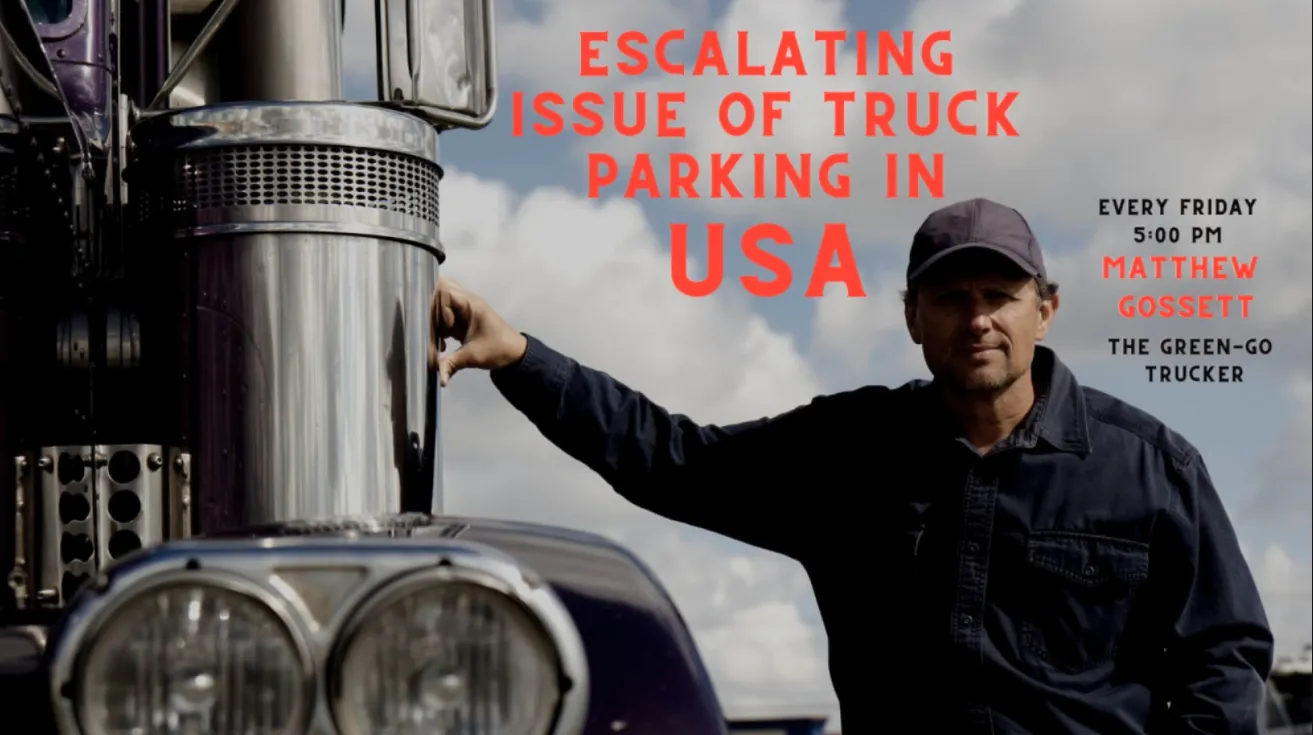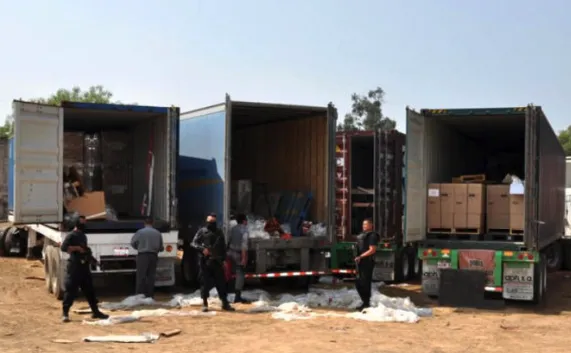
Matthew interviews his producer, a reporter interviews him and they all analyze the trucking business in a friendly and bilingual broadcast
The article explores a range of initiatives aimed at tackling the truck parking shortage, including innovative apps connecting drivers with available spaces and investments in truck parking facilities with enhanced amenities
Green-go Trucker06/10/2023 Matthew Gossett (The GreenGo Trucker)
In a bustling world where the relentless movement of goods and commodities is the lifeblood of the economy, the challenges faced by those who keep the wheels of commerce turning are often overlooked. A chance encounter with the woes of long-haul truck drivers recently brought this issue to the forefront, shedding light on the critical issue of truck parking. As journalist Henry Grabar embarked on a mission to explore parking conflicts, he stumbled upon a problem that has been plaguing the nation's two million truck drivers. This article takes a deep dive into the truck parking crisis, its consequences, potential solutions, and the pressing question of who should shoulder the responsibility.
I. Introduction: A Journalist's Eye-Opening Journey
The story begins with Henry Grabar, an intrepid journalist, who set out to investigate parking conflicts but ended up unearthing the challenges faced by the unsung heroes of our highways - truck drivers. His unexpected foray into the world of trucking illuminated a stark contrast between the allocation of resources for residential parking and the daily struggles of those who crisscross the nation's roads.
II. The Truck Parking Challenge: A Battle for Space
A. The severity of the issue becomes apparent as we delve into the statistics. Shockingly, truck drivers spend a significant portion of their day hunting for elusive parking spots. Data from the American Trucking Associations reveals a harrowing reality: for every 11 truck drivers on the road, there is only one available parking spot.
B. The introduction of the electronic logging device mandate in 2018 is discussed as a contributing factor to truckers' parking woes. These strict regulations have created a race against the clock, making finding suitable parking within permitted hours an uphill battle.
C. An alarming trend emerges, highlighting the mismatch between the increasing total miles driven by freight trucks and the insufficient growth of public and private rest stops. Despite their substantial contributions to the economy, truckers find themselves undersupported.
D. To bring these challenges to life, we hear from truck drivers themselves. Their firsthand accounts reveal the desperate measures they must resort to, including parking in unsafe locations due to the scarcity of legitimate spots.
III. The Tragic Consequences: Lives at Risk
A. The article paints a vivid and sobering picture of the dangers truck drivers face when forced to park on the shoulders of freeways or in abandoned lots. Real-life incidents, including the tragic case of Jason Rivenburg, serve as haunting reminders of the life-threatening consequences of inadequate parking options.
B. In response to Rivenburg's murder, Jason's Law was passed, aiming to address the truck parking issue. However, its full implementation remains uncertain, leaving drivers in a perilous predicament.
C. The article emphasizes the critical role of adequate rest for truck drivers, not only for their well-being but also for the safety and efficiency of the supply chain. A recent Department of Transportation report on truck parking underscores this vital point.
IV. Solutions and Challenges: Bridging the Gap
The article explores a range of initiatives aimed at tackling the truck parking shortage, including innovative apps connecting drivers with available spaces and investments in truck parking facilities with enhanced amenities. However, the question of responsibility looms large.
The piece raises important questions about who should take the lead in solving this crisis. Private-public partnerships are suggested as a potential solution, but funding remains a significant hurdle. Delving into the ethical and economic considerations of shifting the cost burden to private businesses or trucking companies, the article lays bare the complexity of this challenge.
V. Conclusion: A Roadmap for Change
In conclusion, the truck parking crisis is not merely a concern for the nation's two million truck drivers; it's a matter of safety, efficiency, and economic vitality. As we reflect on the urgent need to address this issue, it's crucial to consider who should ultimately bear the responsibility of funding and solving the truck parking shortage.
As we move forward, we must keep in mind that resolving this crisis is not just about finding a parking spot—it's about safeguarding the well-being of those who keep our nation's economy moving and ensuring the reliability of the supply chain that touches every aspect of our lives. It's a question that demands our attention and action. Who should shoulder the responsibility of solving the truck parking shortage? It's a question that resonates far beyond the highways and affects us all.

Matthew interviews his producer, a reporter interviews him and they all analyze the trucking business in a friendly and bilingual broadcast

Matthew Gossett, born in the scenic coastal city of Pensacola, FL in 1973, has carved a unique path as an author and content creator with a substantial digital footprint

Sameer has elevated his sleeping quarters with the addition of LED mood lighting. These color-changing lights create a serene ambiance, ensuring peaceful slumber in the midst of the open road's solitude

Rising Theft Incidents and Ingenious Tactics Threaten Supply Chain Security

The industry's competitive wages make it an appealing career choice for some women

Veterans bring an exceptional blend of skills and attributes to the trucking industry. They are renowned for their discipline, unwavering work ethic, and dedication

Asegurar que nuestros clientes reciban el más alto nivel de servicios profesionales a través de nuestro compromiso con la excelencia, la honestidad y la satisfacción laboral.

No olvides que si estás usando otro logbook y quieres cambiarte al mejor servicio de PATRIOT, muy probablemente puedas usar con PATRIOT el dispositivo que hoy tienes

"Aunque como hoy haya venido sin cita, súper apurado porque tengo que recoger una carga para salir en breve, me voy 100 % satisfecho. Muchas gracias a la gente de Patriot"

Elite Insurance & Beyond es lo que necesitas para manejar sin preocupaciones. ¡Llama ya!

La fe ha llegado otra vez para quienes desandan las carreteras